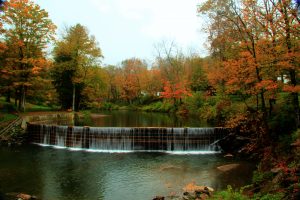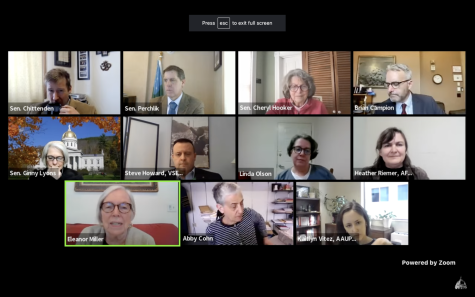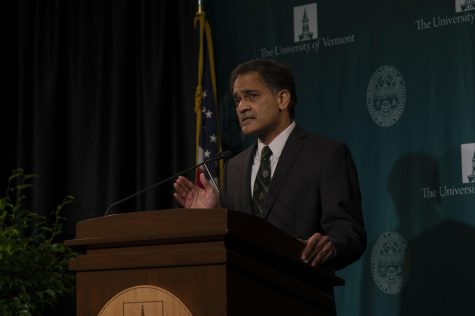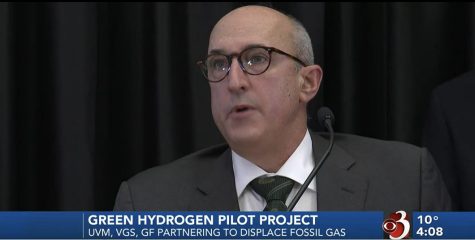Kayakers protest restrictions
Students may be unable to kayak on the Green River as a result of a licensing issue between the state and a local electric company.
Morrisville Water and Light operates three hydroelectric dams — two on the Lamoille River in Morrisville and one on the Green River in Hyde Park. Since hydroelectric ownership is under the jurisdiction of the federal government, companies are required to obtain licenses to operate on waterways, MWL General Manager Craig Myotte said..
The company was established in 1895 and services roughly 3,800 residential and commercial customers, according to their website.
MWL’s hydroelectric license expired April 2015, but the company began the relicensing process in 2010, Myotte said.
The relicensing process has been facing difficulties from the state, namely the Agency of Natural Resources, regarding requirements MWL must meet before the process can be complete, Myotte said.
He said recent environmental studies indicate that a certain amount of water must remain in the bypass reaches or the reach of a river between a dam and powerhouse.

Sophomore Carli Beisel, president of the UVM Kayaking Club, said the restrictions enforced by the ANR will also have an effect on recreational activity on the Green River.
She said the study the agency looked at to establish requirements is outdated and inaccurately states that excess water releases will kill off fish populations. If they were willing to pay for a new study, it would show different results, she said.
Beisel said UVM Kayaking is trying to push for more whitewater releases on the Green River to increase their ability to use the waterway. Currently, there are only two releases a year, and if the ANR restrictions are put in place, there would no longer be any.
“It’s sad because all of the rivers in the world are just being dammed up,” Beisel said. She said she feels that rivers are common property and shouldn’t be under the control of anyone, but rather should be left in the hands of the environment.
Beisel said it’s rare to see a river with as little development as the Green River, which makes it a popular spot for things like kayaking, fishing and boating. She said people, including members of the Vermont Paddlers Club, are very bummed about the new regulations.
“I’ve yet to meet a kayaker who isn’t against it,” Beisel said.
UVM Kayaking is going to continue to fight the issue, she said. The relicensing is still in its beginning stages, and probably won’t come into effect until 2020, she said.
“People need to try and understand what’s going on,” Beisel said. “[They need to] try and preserve one of the few rivers that we have and make it accessible to everyone.”
Myotte said MWL generates more energy when there is less water in the bypass and said the hydroelectric process is completely renewable. Water removed from the river is processed through the hydroplant and put back into the waterway, and doesn’t result in water loss, he said.
Myotte said the company is able to bring the water level down to almost nothing to generate energy, but the state is arguing that they shouldn’t be able to drop the water down that far.
“We find it offensive that here we have an existing renewable resource and they’re trying to reduce it for the community,” Myotte said.
Deb Markowitz, secretary of the Agency of Natural Resources in Vermont, said companies wishing to utilize the water resources need to comply with the Clean Water Act because of the federal government’s involvement.
When MWL applied for their license 30 years ago, they weren’t subject to the same requirements as they are now, Markowitz said.
There are many ways hydroelectric plants can operate, but some produce high amounts of energy, which is dangerous to fish habitats and dangerously warms the water temperature, she said.
“Here we have two public policies that can coexist,” Markowitz said. She said it’s possible to protect fish populations and use renewables, but there needs to be a compromise and MWL needs to make adjustments.
The ANR drafted a water quality certification which included conditions about the detailed operation of hydroelectric plants, but Myotte said the agency wasn’t looking at the bigger picture, and was only paying attention to fish populations and aesthetics.
He said the loss of energy generation would require him to put an upward pressure on his rates, which isn’t ideal considering MWL is a non-profit, small rural utility. Many of the company’s customers are elderly and on fixed incomes, which directly conflicts with his personal goal of decreasing energy rates, he said.
“I’m opposed to having to increase our rates because of a decision we’re getting from the ANR,” Myotte said.
MWL would need to purchase replacement energy from a marketplace to make up for the loss of hydroelectric generation, Myotte said. This energy would likely be a mixture of carbon-based resources that aren’t renewable, which Myotte says “doesn’t make any sense.”
“How strange is it that [Governor] Shumlin is promoting as much renewable energy as possible, and yet we have a wing in the state government doing the exact opposite,” he said. “I can’t figure that out.”
Markowitz said MWL has the option to purchase renewable energy like Burlington Electric Company. She said Burlington Electric uses only renewable resources, some of which is generated by them, and the rest is purchased from outside suppliers.
Markowitz said the clean water permit the ANR is issuing requires MWL to adjust because the type of equipment they use. If the company put in more turbines, they would be able to produce an efficient amount of energy for the community while still complying with the law, she said.
“The Clean Water Act is the rule of law,” Markowitz said. The law has specific requirements that focus on animal habitats, and the ANR is unable to take economic hardship into account under the legislation, she said.
“These are tough conversations to have,” Markowitz said. “We have two important goals that collide. We would like to make an exception for renewable energy, but we cannot.”

Bryan is the managing editor of the Vermont Cynic and has been involved since Jan. 2015. Prior to his position as managing editor, he was a news writer...











